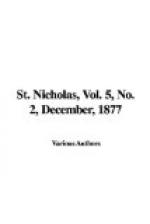There was a friend of Mr. Alcott’s then living in Concord, not far from Boston,—a man of great wisdom and goodness, who had been very sad to see the noble Connecticut school-master so shabbily treated in Boston,—and he invited his friend to come and live in Concord. So Louisa went to that old country town with her father and mother when she was eight years old, and lived with them in a little cottage, where her father worked in the garden, or cut wood in the forest, while her mother kept the house and did the work of the cottage, aided by her three little girls. They were very poor, and worked hard; but they never forgot those who needed their help, and if a poor traveler came to the cottage door hungry, they gave him what they had, and cheered him on his journey. By and by, when Louisa was ten years old, they went to another country town not far off, named Harvard, where some friends of Mr. Alcott had bought a farm, on which they were all to live together, in a religious community, working with their hands, and not eating the flesh of slaughtered animals, but living on vegetable food, for this practice, they thought, made people more virtuous. Miss Alcott has written an amusing story about this, which she calls “Transcendental Wild Oats.” When Louisa was twelve years old, and had a third sister ("Amy"), the family returned to Concord, and for three years occupied the house in which Mr. Hawthorne, who wrote the fine romances, afterward lived. There Mr. Alcott planted a fair garden, and built a summer-house near a brook for his children, where they spent many happy hours, and where, as I have heard, Miss Alcott first began to compose stories to amuse her sisters and other children of the neighborhood.




